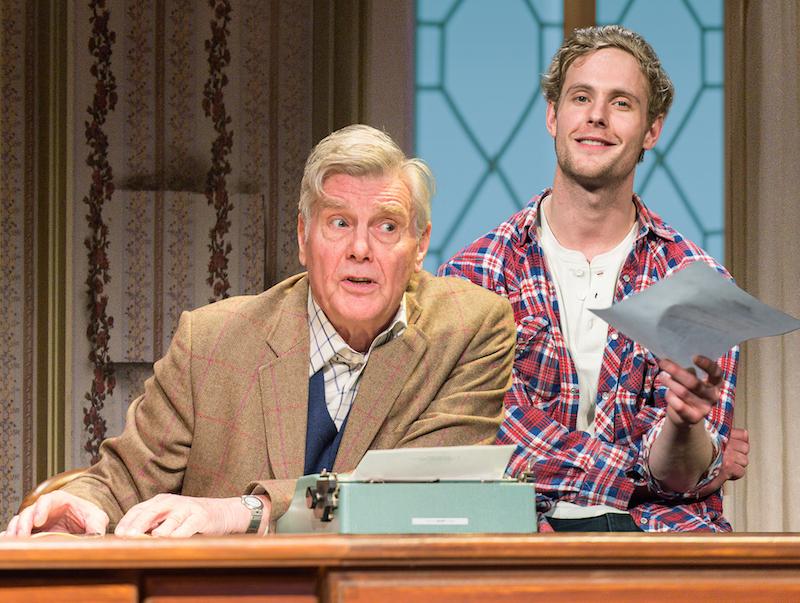A sterling case is made for the lost art of letter-writing in Michael Simkins’ dramatisation of Roger Mortimer’s missives to his wayward son. Mortimer’s inimitable turn of phrase, preserved in epistolary form, is the highlight of a genial show notable more for its casting of a real father and son than provision of gripping drama. It’s cosy as a pair of bedroom slippers, best enjoyed with a glass of Mortimer-approved sherry, but hasn’t entirely transitioned from one medium to another.
The deliciously waspish letters of Mortimer Senior, “racing hack and long-suffering father”, were collated by his son in a surprisingly successful 2012 tome. Here, in the third layer of authorship, Simkins provides the other half of the conversation, with Charlie (Jack Fox, pictured below) – nicknamed “Lupin” after the similarly disreputable son in Diary of a Nobody – narrating his chaotic (though inescapably privileged) life, from troublemaking at Eton in the Sixties to a string of unsuccessful jobs, including service in the Coldstream Guards, and slide into addiction.
 In the liveliest segments, the pair re-enact some of these escapades, with James Fox gamely portraying everyone from a doughty army colonel and foulmouthed antiques dealer to an ageing Soho prostitute and flamboyant auctioneer. Energetic comic vignettes aside, Jack Fox’s stage inexperience shows as he struggles under the weight of exposition, and the piece’s wordiness occasionally defeats both actors.
In the liveliest segments, the pair re-enact some of these escapades, with James Fox gamely portraying everyone from a doughty army colonel and foulmouthed antiques dealer to an ageing Soho prostitute and flamboyant auctioneer. Energetic comic vignettes aside, Jack Fox’s stage inexperience shows as he struggles under the weight of exposition, and the piece’s wordiness occasionally defeats both actors.
The crux of the play is Charlie’s realisation that his undemonstrative, upper-crust father has, in fact, always communicated deep affection, if indirectly. Yet that epiphany is made hazy by the timeline: several decades are covered, but it’s never entirely clear if this is all rose-tinted reminiscence, or if the process of ageing and greater understanding should be more evident. Hindsight lessens conflict, with Charlie’s self-destructive hedonism reported as amusing hijinks after the fact, and Roger’s response at worst ruefully sardonic. Tragic later developments are poignantly and elegantly played, but unanswered questions linger, such as the extent of Roger’s knowledge of his son’s sexuality.
Best, then, to simply luxuriate in the pithy putdowns and bone-dry non-sequiturs of one of our great humourists. Fox, master of the well-meaning toff, does them all justice, whether labelling Yoko Ono “as erotic as a sack of dead ferrets”, musing that diarrhoea is not just uncomfortable but “very hard to spell”, or explaining the rationale for his “Six Easy Ways To Die While Gardening” article in the village magazine. We may, however, suspect that the best character is kept offstage: Mrs Mortimer AKA “the Bureau of Misinformation” – inclined to confuse “biopsy” and "autopsy” – is perennially sloshed, sports an increasingly lopsided wig, and clouts dissenting in-laws. Could we draft in a female Fox?
Philip Franks’ theatrical elements, from a celestial Mastermind to intrepid use of Adrian Linford’s climbable junk shop set, are enjoyable, but too sporadic, while Matthew Bugg’s somnolent piano cues accentuate the dated feel. Congenial, if rather dusty, summer viewing.















Add comment